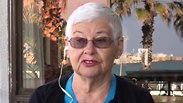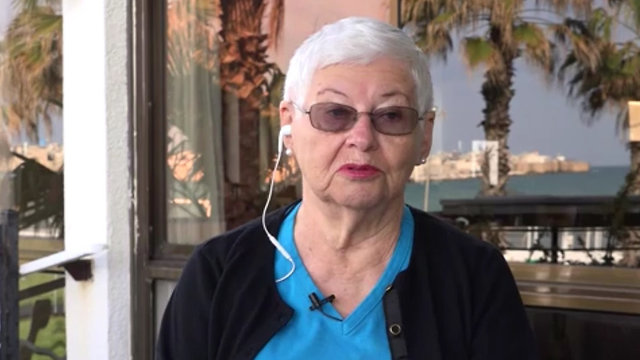

Holocaust survivor attests to Poles who helped as she was hunted
Aliza Landau's father rescued her and her siblings from a ghetto; wandering the Polish countryside for 5 years in an attempt to skirt the Nazis' attention; she ‘depended strictly on kindness, mercy of Poles who helped us’; she notes, however, 'many others ratted Jews out.'
For Aliza Landau, the answer is clear: for about five years, her family traveled across Poland while hiding from the Nazis, and Poles in the countryside saved their lives time and again.
"I was born in Łódź and my family's life was good. My parents were well to do economically, and everything looked fine. When the winds of war started blowing, however, my father decided to leave us and hide out with Polish friends of his, because he thought if we were all together and had to help each other, we couldn't do it," she recounted.

"It turned out this line of thinking was correct, because the moment the Germans entered, my mother, brother and I were taken to a ghetto," the Holocaust survivor went on to say,
"Dad helped us, smuggled us out of the ghetto and we began wandering around the Polish countryside for about five years. We were only helped by Polish farmers. At first, dad had money and he could pay for the hideouts, but eventually we depended strictly on the kindness and mercy of the Poles who helped us," she added, attesting to the fact with first-hand experience that some Poles acted to save Jews.
Asked about her family's relationship with the Poles who helped them, Landau said, "They truly helped us. They fed us, hid us and—when things got really hard—found us a new hiding place. We wandered among the Polish villages and they helped us.
"I can say I am truly grateful to these people—people who have not been recognized, most of whom were illiterate—with whom we eventually lost contact," she lamented.
Her family's quest to skirt the Germans' attention, she said, lasted "until the Soviet army crossed the border from the Ukraine into Poland and began moving west. We were among the first to be freed of the Nazis' yoke, in fact, because we wandered until reaching Poland's eastern frontier with the Ukraine."
Landau has since returned to Poland. Upon being asked whether she understood their desire to prove that they too suffered from the Nazi occupation, she said, "I was a girl at the time and can't really analyze it as a grown person might, but I can certainly understand—the Poles are highly nationalistic and when someone dares say something bad about them, it hurts them and they do their best to deny it."
The diplomatic crisis that ensued from the Holocaust law, she suggested, was due to a mistake by the Poles of going too far.
"I think this has been something of a misstep, because they climbed too high a tree that they can't quite figure out how to get down from. Just like there were people who helped, many others ratted out (Jews) and disrupted them," she noted. "Three Poles who were Nazi collaborators and found us hiding in a pit wanted to turn us in. It's hard to find a middle ground, or balance," she concluded.















